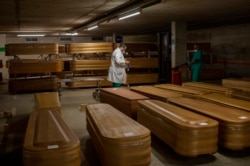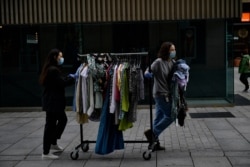More than half of Spain returned to a semblance of normality Monday, as the lockdown eased in most of the country except in Madrid, Barcelona and other regions where infection levels remain too high.
Grandparents hugged grandchildren they not seen for weeks under new rules in which up to 10 people can meet, and people can move around their province but not to other parts of Spain.
Cafe terraces — so much a part of Spanish daily life — opened again but at reduced capacity. Museums, gyms and hotels opened their doors for the first time in nearly two months under strict hygiene regulations.
Under what the Spanish government called Phase 1 of the relaxation of the state of emergency, regions that qualified must have lower infection rates and a fixed number of intensive care beds.
Spain's health ministry said the number of fatalities dropped to 123 on Monday from 143 on Sunday, a seven-week low in one of the world's worst affected countries where 26,744 people have lost their lives to the coronavirus.
With the world’s second-highest infection rate, Spain had reported 227,436 confirmed cases by Monday.
Too early to claim victory
Reports that the number of cases had risen again in Germany and South Korea after the easing of regulations prompted warnings that the same could happen in Spain.
Fernando Simón, Spain’s health emergency chief, said in a press conference, “We are in a very delicate phase. If we do not do things well, we could go the same way as Korea.”
The Robert Koch Institute in Germany said on Sunday that the number of people each sick person now infects — known as the reproduction rate — had risen to 1.1, meaning the infection is growing.
The Korea Centers for Disease Control and Prevention reported 34 new infections, the highest since April 9, after a small outbreak centered around nightclubs.
Breaking the rules
When Spain started easing lockdown regulations last week, police reported 400 botellones (outdoor drinking parties) in violation of restrictions that most Spaniards had obeyed for months.
In Madrid, municipal police said it had broken up 97 drinking parties over the weekend, fined 400 people and arrested three.
In Alicante, located in southeastern Spain, police said they noted a rise in people breaking lockdown rules.
Passengers on an Iberia Airlines flight between Madrid and Gran Canaria in the Canary Islands on Sunday posted film on Twitter showing travelers seated next to each other, in an apparent violation of social distancing rules.
Passenger Efren Hernández tweeted, “The flight is almost full and there is not even a seat between passengers? Shame.”
José Luís Ábalos, the Spanish transport, said he would demand answers from the airline.
Iberia said in a statement, “We would like to assure you that we comply with all the security measures demanded by the authorities. We have reinforced cleaning and disinfection in the cabin and our fleet has a filter system which is 99% effective against virus and bacteria.”
Businesses hurting
Madrid, Barcelona and other regions, including Valencia, Andalusia and Castilla y León, must remain under stricter restrictions that angered regional governments and business leaders.
Under these rules, restaurants and other small businesses can only offer take-away services, and terraces in cafes must remain closed.
Kate Preston, a British businesswoman who runs nine restaurants and employs 150 people in Barcelona, told VOA in a telephone interview that she believes there was a “economic tsunami round the corner” in Spain.
“I thought restaurants would be OK by July or August, but with no tourists coming, 50% of restaurants will not survive,” she said.
Preston said high overhead, lack of customers, and government measures that protected workers but penalized businesses would be a death knell for many companies.
“This government is bringing in measures to help workers, workers, workers, but what they do not understand is if you do not look after businesses, then workers will lose their jobs,” she said.
The Spanish government has said businesses cannot fire laid-off workers for up to six months after they return from work and must also pay between 40% to 60% of social security.














